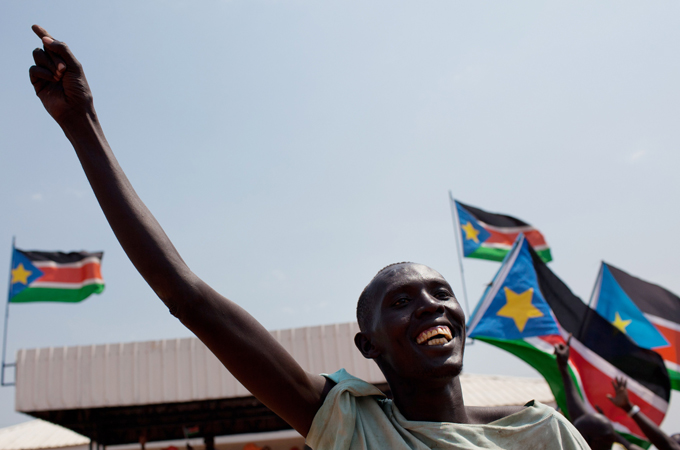South Sudan set for referendum
Euphoria grips the region, as local residents gear up to vote for unity or separation.

 |
| Residents in South Sudan gear up for a referendum that may result in the creation of a new country [AFP] |
Millions of South Sudanese are set to vote in a historic referendum to decide whether the south splits from the north.
The weeklong referendum begins on Sunday and in order for it to pass, a simple majority must vote for independence and 60 per cent of the 3.9 million registered voters must cast ballots.
A sense of euphoria gripped the regional capital Juba on the eve of the referendum as people feted the looming end of a long and often difficult countdown.
Salva Kiir, the south Sudanese president, said on Saturday that an independent south would be peaceful and work with its northern neighbours.
“Today there is no return to war,” he said.
Kiir also ensured the local population that regional authorities had done all they could to ensure a peaceful referendum, deploying 60,000 police and troops.
“From our side as the government of southern Sudan, we promise you an atmosphere of calm and guaranteed security, as you exercise your democratic right to determine your destiny according to your free will,” he said.
Southern Sudanese will cast simple, illustrated ballots at polling stations under thatched roof shelters in the remote and impoverished countryside and in Juba, a city of simple concrete houses and mud huts that got its first paved roads only in recent years.
If it passes, the referendum will split Africa’s biggest country between the mostly Arab and Muslim north, and the mostly black and Christian or animist south.
Southern Sudan would then be on track to become the world’s newest country in July. Outstanding issues like sharing oil wealth, water rights and demarcating the border still have to be agreed to.
Aid groups also fear that southerners living in the north and northerners living in the south will face harassment and abuse.
Deadly clashes
But the celebrations were marred by deadly clashes in two key oil-producing districts on the border with the north, which underlined both the fragility of an uneasy peace that has been established over most of the south and the potential for renewed violence.
At least seven people were killed in clashes involving south Sudan security forces. Six people were killed in fighting between south Sudan’s army and a pro-Khartoum militia in Unity state and another person died in clashes between the Misseriya tribe and police in the disputed Abyei region.
Earlier reports on Saturday had said 19 people had been killed in Abyei, the border region which is claimed by both the north and the south, but Al Jazeera could only confirm one of the deaths.
Al Jazeera’s Mohammed Vall, reporting from Muglad, cited a spokesman for the Sudan People’s Liberation Movement (SPLM) which governs the south, as saying the unrest in Abyei had started on Friday and involved the Misseriya tribe, which is loyal to the Khartoum government.
Deng Arop Kuol, Abyei’s chief administrator, said “unknown gunmen” had attacked civilians in the Makeir area.
“Several civilians were killed,” he said.
Strife-torn region
Threats by leaders of the district’s settled pro-southern Ngok Dinka population to take unilateral action over the poll delay had sparked fears of clashes with the heavily armed Misseriya who use its waters for seasonal pasture.
There were also clashes between the southern army and renegade militiamen in remote Unity State on the border with the north whose oilfields were a key fighting point in the 1983-2005 civil war.
Over two days, southern troops killed six militiamen and captured 32 without sustaining any casualties, military spokesman Philip Aguer said.
The conflict between the Muslim, mainly Arab north, and the African, mainly Christian south, has blighted Africa’s largest nation virtually since independence from Britain in 1956, fuelled by religion, ethnicity, ideology and resources, particularly oil.
In an interview with Al Jazeera on Friday, Omar al Bashir, the president, said he still did not believe the south was ready for independence.
“The south does not have the ability to provide for its citizens, or create a state or authority,” he said.